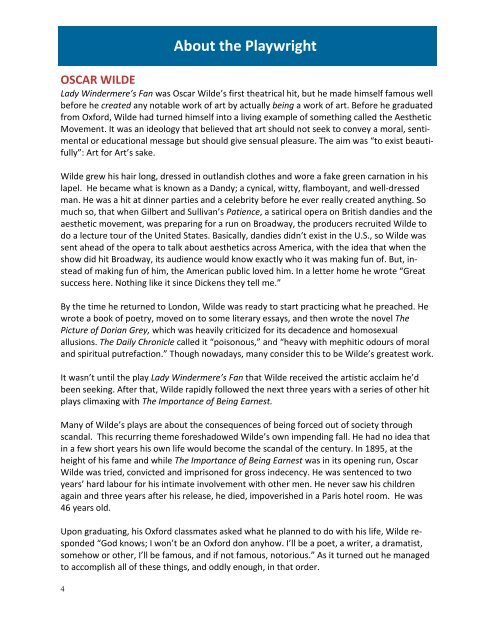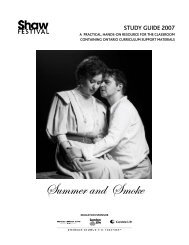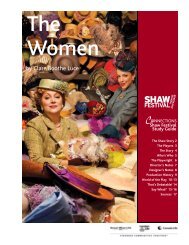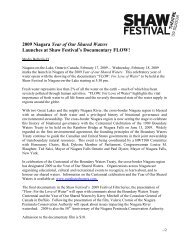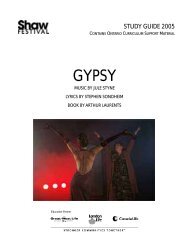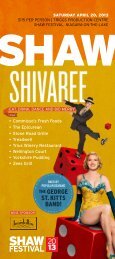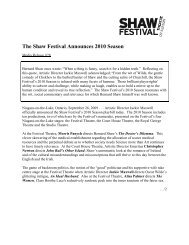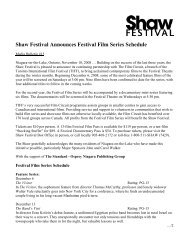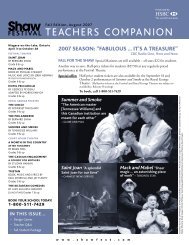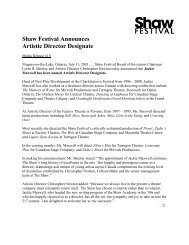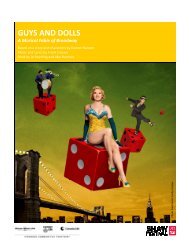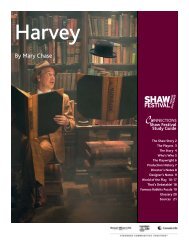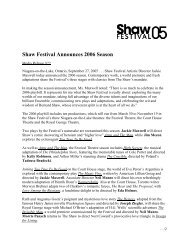the Lady Windermere's Fan study guide. - Shaw Festival Theatre
the Lady Windermere's Fan study guide. - Shaw Festival Theatre
the Lady Windermere's Fan study guide. - Shaw Festival Theatre
Create successful ePaper yourself
Turn your PDF publications into a flip-book with our unique Google optimized e-Paper software.
About <strong>the</strong> Playwright<br />
4<br />
OSCAR WILDE<br />
<strong>Lady</strong> Windermere’s <strong>Fan</strong> was Oscar Wilde’s first <strong>the</strong>atrical hit, but he made himself famous well<br />
before he created any notable work of art by actually being a work of art. Before he graduated<br />
from Oxford, Wilde had turned himself into a living example of something called <strong>the</strong> Aes<strong>the</strong>tic<br />
Movement. It was an ideology that believed that art should not seek to convey a moral, sentimental<br />
or educational message but should give sensual pleasure. The aim was “to exist beautifully”:<br />
Art for Art’s sake.<br />
Wilde grew his hair long, dressed in outlandish clo<strong>the</strong>s and wore a fake green carnation in his<br />
lapel. He became what is known as a Dandy; a cynical, witty, flamboyant, and well-dressed<br />
man. He was a hit at dinner parties and a celebrity before he ever really created anything. So<br />
much so, that when Gilbert and Sullivan’s Patience, a satirical opera on British dandies and <strong>the</strong><br />
aes<strong>the</strong>tic movement, was preparing for a run on Broadway, <strong>the</strong> producers recruited Wilde to<br />
do a lecture tour of <strong>the</strong> United States. Basically, dandies didn’t exist in <strong>the</strong> U.S., so Wilde was<br />
sent ahead of <strong>the</strong> opera to talk about aes<strong>the</strong>tics across America, with <strong>the</strong> idea that when <strong>the</strong><br />
show did hit Broadway, its audience would know exactly who it was making fun of. But, instead<br />
of making fun of him, <strong>the</strong> American public loved him. In a letter home he wrote “Great<br />
success here. Nothing like it since Dickens <strong>the</strong>y tell me.”<br />
By <strong>the</strong> time he returned to London, Wilde was ready to start practicing what he preached. He<br />
wrote a book of poetry, moved on to some literary essays, and <strong>the</strong>n wrote <strong>the</strong> novel The<br />
Picture of Dorian Grey, which was heavily criticized for its decadence and homosexual<br />
allusions. The Daily Chronicle called it “poisonous,” and “heavy with mephitic odours of moral<br />
and spiritual putrefaction.” Though nowadays, many consider this to be Wilde’s greatest work.<br />
It wasn’t until <strong>the</strong> play <strong>Lady</strong> Windermere’s <strong>Fan</strong> that Wilde received <strong>the</strong> artistic acclaim he’d<br />
been seeking. After that, Wilde rapidly followed <strong>the</strong> next three years with a series of o<strong>the</strong>r hit<br />
plays climaxing with The Importance of Being Earnest.<br />
Many of Wilde’s plays are about <strong>the</strong> consequences of being forced out of society through<br />
scandal. This recurring <strong>the</strong>me foreshadowed Wilde’s own impending fall. He had no idea that<br />
in a few short years his own life would become <strong>the</strong> scandal of <strong>the</strong> century. In 1895, at <strong>the</strong><br />
height of his fame and while The Importance of Being Earnest was in its opening run, Oscar<br />
Wilde was tried, convicted and imprisoned for gross indecency. He was sentenced to two<br />
years’ hard labour for his intimate involvement with o<strong>the</strong>r men. He never saw his children<br />
again and three years after his release, he died, impoverished in a Paris hotel room. He was<br />
46 years old.<br />
Upon graduating, his Oxford classmates asked what he planned to do with his life, Wilde responded<br />
“God knows; I won’t be an Oxford don anyhow. I’ll be a poet, a writer, a dramatist,<br />
somehow or o<strong>the</strong>r, I’ll be famous, and if not famous, notorious.” As it turned out he managed<br />
to accomplish all of <strong>the</strong>se things, and oddly enough, in that order.<br />
4


